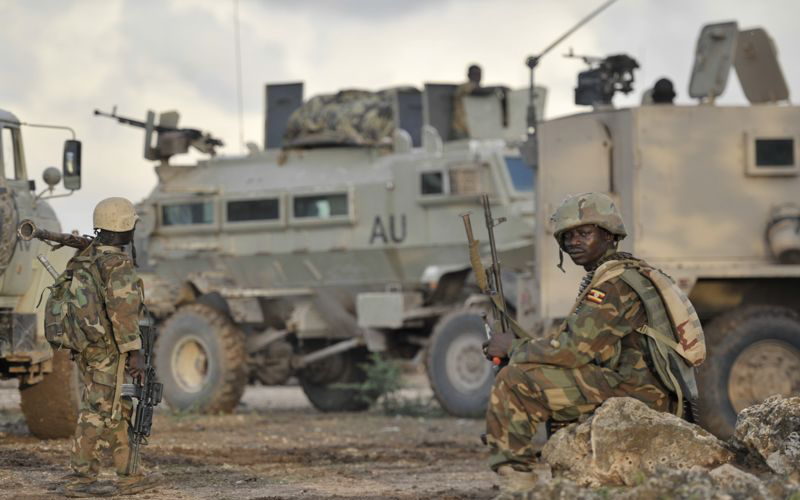
Is the African Union Capable of Defeating Boko Haram?
Boko Haram has created havoc across Africa in recent years. In its relentless efforts to establish an Islamic Caliphate on the continent, its fighters have assassinated politicians, blown up markets and kidnapped schoolgirls. Initially African nations seemed to be unsuccessful in dealing with the chaos propagated by the group, but since last year there is a more united front in the form of the African Union Multinational Joint Task Force (MNJTF), whose joint efforts to tackle Boko Haram have proved largely successful.
Despite doubts over whether the MNJTF would actually lead to more troops tackling the issue or if it was just an example of “rehatting” soldiers who were already engaged in the fight, soldiers from Chad, Niger, Cameroon, and Benin have helped Nigeria successfully retake most of the territory that had previously been claimed by the extremist group, proving that African national armies are capable of coordinating such efforts effectively. For example, only last month in the Nigerian village of Kumshe, Cameroonian and Nigerian forces killed 92 members of the Islamist group, freeing some 850 villagers.
This victory came just over a year after the humiliating offensive in January 2015, which saw MNJTF troops abandon their posts at their base outside Baga, Nigeria as they were attacked by Boko Haram from “all directions.”
At the time, a senator from Borno, the region where the MNJTF base was located, commented that “there is definitely something wrong that makes our military abandon their posts each time there is an attack from Boko Haram.”
African nations have since worked together to tackle this “something wrong” by supplying the military might needed to tackle the threat posed by Boko Haram. For example in May 2015, Chad, whose president Idriss Deby is the current chair of the African Union (AU), began his tenure with a renewed desire to bring down the terrorist group. In one of his first addresses as head of the AU, Deby unequivocally stated “Our organisation acts as it has for the past 20 or 30 years: we meet often, we talk too much, we always write a lot, but we don’t do enough.” The president has contributed a large chunk of the 8,700 troops fighting the insurgents and has agreed to host the new MNJTF headquarters in Chad’s capital, N’Djamena.
This new cross-border capability is clearly having an impact. It is a bittersweet success that Boko Haram has been forced to resort to suicide attacks since it can no longer rely on seizing and controlling territory. In August of last year, ten members of the group were executed in Chad for their role in a suicide blast two months earlier which killed 38 people, the death penalty having been hurriedly reintroduced by Deby for acts of terror in the wake of the atrocity. And only last month, two suicide bombers killed at least 12 people and injured 50 more in a market in Meme, northern Cameroon.
The efforts of the African nations have been reinforced by support from overseas, albeit rather limited in quantity. In September, France promised to provide equipment to help beat the terrorists as well as sharing intelligence.The US is also supporting the MNJTF through its annual ‘Flintock’ counter-terrorism initiative which provides US Army trainers to help African armies develop their skills. And in October, the US bolstered Cameroonian forces by sending 90 troops to the African nation. In a letter sent under the War Powers Resolution, Obama said that the total number of US military personnel would eventually rise to approximately 300 and would provide airborne intelligence, surveillance and other reconnaissance operations.
Much has been achieved so far in the fight against Boko Haram. There is clearly a model for cooperation between African states, but progress will be stymied until the barriers impeding the MNJTF are addressed, such as the rather negligible size of the army in comparison with the task in hand, a shaky command structure and a limited geographical scope which means that the force doesn’t have a mandate to do much more than intercept Boko Haram forces moving through border areas around Lake Chad.
Many of these issues can be traced back to Nigeria’s reluctance to relinquish the reins to neighboring states, even when it is in its own interests to do so. Combined, these factors mean that the MNJTF in its current incarnation will be unlikely to defeat Boko Haram. However, thanks to the involvement of regional leaders, that could change rapidly. Since Deby assumed the presidency of the AU, the Chadian leader has mobilized the resources of the organization and has orchestrated a stronger push against the terrorist group. The first results are already there, as on March 4th, the AU greenlit an expansion of the MNJTF to 10,000 troops.
In February, the Commander of the Multinational Joint Task Force (MNJTF), Major General Lamidi Adeosun, stated that he could now “categorically state that the Multinational Joint Task Force is now fully operational and functioning in its fight against the insurgency.” At the moment, that statement seems somewhat hyperbolic, but with the right support and troops it could well become a reality. And if it so chooses, the international community could make this happen sooner. The US’ recent announcement that it will send dozens of Special Operations advisors to support Nigeria and its allies in the war against Boko Haram is a step in the right direction. Other international powers with the expertise and capacity to provide support should be encouraged to follow suit in order to help Africa rid itself of the scourge of Boko Haram as quickly as possible.

